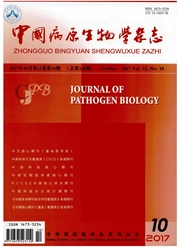

 中文摘要:
中文摘要:
目的分析幽门螺杆菌(Helicobacter pylori,Hp)临床分离株热休克蛋白60基因编码区序列特征。方法对分离自我国不同地区、患有不同胃肠疾病患者的63株Hp提取基因组DNA并设计hsp60特异性引物,采用聚合酶链反应(PCR)扩增hsp60基因,经1%琼脂糖凝胶电泳后切胶回收、纯化PCR产物并测序,用DNAstar5.0软件中的ClustalW程序对hsp60基因序列及南该序列翻译的氨基酸序列进行比较分析。结果成功特异性扩增并纯化到hsp60全基因序列。经序列比对,发现不同胃肠疾病来源的hsp60基因核苷酸序列在877、1399以及1579位点处存在单核苷酸多态性(single nucleotide polymorphism,SNP)。其中来源于非胃癌患者的Hp在以上三位点处分别有8株(8/48,16.67%)G→A置换,9株(9/48,18.75%)C→G置换,7株(7/48.14.58%)A→G置换;胃癌患者来源的Hp在以上三位点处分别有3株(3/18,16.67%)G→A置换,1株(1/18,5.55%)C→G置换,2株(2/18,11.11%)A→G置换。将核苷酸序列翻译为氨基酸序列后,在以上三位点所对应的氨基酸序列,即293、467以及527位点处分别发生了由缬氨酸(V)到异亮氨基酸(1)、谷氨酰胺(Q)到符氨酸(E)以及苏氨酸(T)到丙氨酸(A)的改变。结论我国Hp临床分离株热休克蛋门60基因序列存在单核苷酸多态性位点。
 英文摘要:
英文摘要:
Objective To analyze the sequence characteristics of the hsp60 gene in Helicobacter pylori isolated from different patients. Methods A total of 63 H. pylori strains were isolated from different patients with gastroduodenal diseases in different geographic regions in China. Genomic DNA of these strains was extracted and a pair of primers was designed using Primer Premier 5.0 in accordance with the sequence of hsp60 of Hp ATCC 26695. The hsp60 gene was then amplified using PCR and the products were sequenced. All sequenced fragments were subjected to a multiple alignment with the program ClustaI W in DNAstar 5.0 software. Results The hsp60 gene was successfully cloned and purified. According to DNA sequencing and alignment, single nucleotide polymorphisms (SNPs) were noted at sites 877, 1 399, and 1 579. In the H. pylori isolated from non-gastric cancer patients, 8 strains (8/48, 16.67%) had a G to A substitu tion at sites 877, 1 399, and 1 579, 9 strains (9/48, 18.75%) had a C to G substitution, and 7 strains (7/48, 14.58%) had an A to G substitution. In gastric cancer patients, 3 strains (3/18, 16.67%) had a G to A substitution at sites 877, 1 399, and 1 579, 1 strain (1/18, 5.55%) had a C to G substitution, and 2 strains (2/18, 11.11%) had an A to G sub stitution. The deduced amino acid sequences of these 3 sites revealed a Val to Ile substitution, Gln to Glu substitution, and Thr to Ala substitution, respectively. Conclusion Results indicated that there are SNPs in the nucleotide and amino acid sequences of the hsp60 gene in H. pylori isolated from different patients in China.
 同期刊论文项目
同期刊论文项目
 同项目期刊论文
同项目期刊论文
 期刊信息
期刊信息
